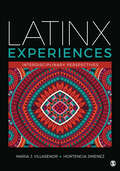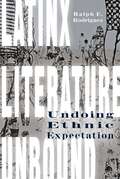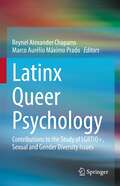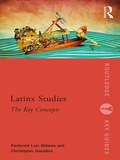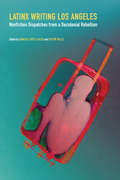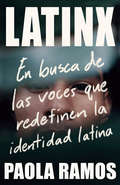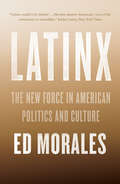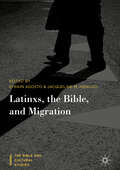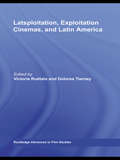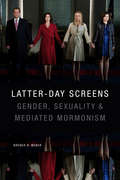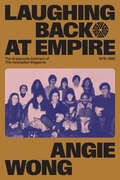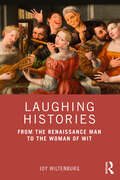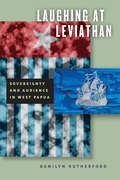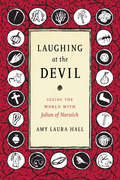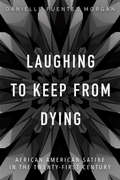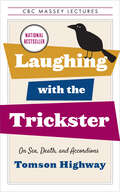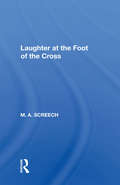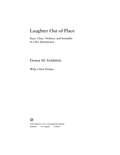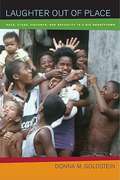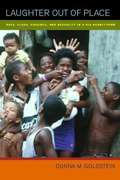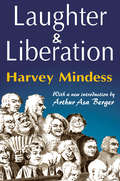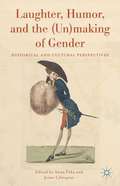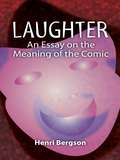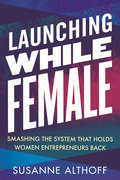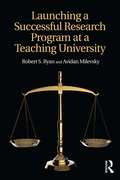- Table View
- List View
Latinx Experiences: Interdisciplinary Perspectives
by Maria J. Villasenor Hortencia JimenezThis reader introduces students to the variety and complexity of Latinxs′ experiences in the U.S., and prepares them for further study in this interdisciplinary field. The opening essay, written by the editors, offers a broad overview of the approximately 59 million people in the U.S. who identify as Hispanic. The rest of the book will consist of contributed essays from Latina(o)/Chicana(o) scholars on a range of subjects including immigration, citizenship, and deportation; racial identities; political participation and power; educational and economic achievement; family; religion; media and popular culture. Although the essays are written for lower-division undergraduates, they reflect many of the leading theoretical and methodological approaches in the field. The essays are unified by an intersectional approach, demonstrating how experiences and life chances of Latinxs are also shaped by gender, social class, sexuality, age, and citizenship status.
Latinx Literature Unbound: Undoing Ethnic Expectation
by Ralph E. RodriguezSince the 1990s, there has been unparalleled growth in the literary output from an ever more diverse group of Latinx writers. Extant criticism, however, has yet to catch up with the diversity of writers we label Latinx and the range of themes about which they write. Little sustained scholarly attention has been paid, moreover, to the very category under which we group this literature. Latinx Literature Unbound, thus, begins with a fundamental question “What does it mean to label a work of literature or an entire corpus of literature Latinx?” From this question others emerge: What does Latinx allow or predispose us to see, and what does it preclude us from seeing? If the grouping—which brings together a heterogeneous collection of people under a seemingly homogeneous label—tells us something meaningful, is there a poetics we can develop that would facilitate our analysis of this literature?In answering these questions, Latinx Literature Unbound frees Latinx literature from taken-for-granted critical assumptions about identity and theme. It argues that there may be more salubrious taxonomies than Latinx for organizing and analyzing this literature. Privileging the act of reading as a temporal, meaning-making event, Ralph E. Rodriguez argues that genre may be a more durable category for analyzing this literature and suggests new ways we might proceed with future studies of the writing we have come to identify as Latinx.
Latinx Queer Psychology: Contributions to the Study of LGBTIQ+, Sexual and Gender Diversity Issues
by Reynel Alexander Chaparro Marco Aurélio Máximo PradoThis book brings together studies that contribute to the emergence of a latinx queer psychology. LGBTQ+ studies have gradually included the perspective of sexual and gender diversity, but they have been predominantly elaborated from North American and European perspectives. This book focuses on different understandings and practices developed by Latin American researchers that contribute to a broader application of psychological knowledge in LGBTQ+ studies, as well as sexual and gender diversity issues, but goes beyond the region by also incorporating chapters written by European and North American authors influenced by latinx perspectives.Latin American psychology has developed original approaches to LGBTQ+ studies based on a new theoretical critique to the mainstream psychological theories that has given rise to a new queer psychology. The chapters in this book showcase both theoretical contributions and empirical researches in this emerging field from six Latin American countries – Argentina, Brazil, Chile, Colombia, Costa Rica and Uruguay – as well as from Spain, the United States and Puerto Rico. Latinx Queer Psychology: Contributions to the Study of LGBTIQ+, Sexual and Gender Diversity Issues aims to contribute to the decolonization of psychological knowledge and practices addressing sexual and gender diversity issues, and to serve as a useful resource for social, community, clinical and educational psychologists working with research and practice involving LGBTIQ+ populations, as well as to social scientists in general interested in queer and gender studies.
Latinx Studies: The Key Concepts (Routledge Key Guides)
by Christopher González Frederick AldamaLatinx Studies: The Key Concepts is an accessible guide to the central concepts and issues that inform Latinx Studies globally. It summarizes, explains, contextualizes, and assesses key critical concepts, perspectives, developments, and debates in Latinx Studies. At once comprehensive in coverage and detailed and specific in examples analyzed, it provides over 25 key concepts to the field of Latinx Studies as shaped within historical, social, cultural, regional, and global contexts, including: • Body • Border Theory • Digital Era • Familia • Immigration • Intersectionality • Language • Latinidad/es • Latinofuturism • Narco Cultura • Popular Culture • Sports Fully cross-referenced and complete with suggestions for further reading, Latinx Studies: The Key Concepts is an essential guide for anyone studying race, ethnicity, gender, class, education, culture, and globalism.
Latinx Writing Los Angeles: Nonfiction Dispatches from a Decolonial Rebellion
by Ignacio López-Calvo Victor ValleLatinx Writing Los Angeles offers a critical anthology of Los Angeles’s most significant English-language and Spanish-language (in translation) nonfiction writing from the city’s inception to the present. Contemporary Latinx authors, including three Pulitzer Prize winners and writers such as Harry Gamboa Jr., Guillermo Gómez-Peña, and Rubén Martínez, focus on the ways in which Latinx Los Angeles’s nonfiction narratives record the progressive racialization and subalternization of Latinxs in the southwestern United States. While notions of racial memory, coloniality, biopolitics, internal colonialism, cultural assimilation, Mexican or pan-Latinx cultural nationalism, and transnationalism permeate this anthology, contributors advocate the idea of a contested modernity that refuses to accept mainstream cultural impositions, proposing instead alternative ways of knowing and understanding. Featuring a wide variety of voices as well as a diversity of subgenres, this collection is the first to illuminate divergent, hybrid Latinx histories and cultures. Redefining Los Angeles’s literary history and providing a new model for English, Spanish, and Latinx studies, Latinx Writing Los Angeles is an essential contribution to southwestern and borderland studies.
Latinx: En busca de las voces que redefinen la identidad latina
by Paola RamosEl primer paso hacia el cambio es reconocer que nuestro poder nace de nuestra identidad. Los jóvenes latinos en los Estados Unidos están redefiniendo su identidad, rompiendo moldes establecidos, y despertando políticamente de maneras sorprendentes y poderosas. Muchos de ellos—afrolatinos, indígenas, musulmanes, queer e indocumentados tanto en zonas urbanas como rurales—representan voces históricamente ignoradas en el modo en que la diversa población de casi seis millones de latinos en los Estados Unidos ha sido representada. Hasta ahora. En esta inspiradora crónica de viaje de costa a costa, la periodista y activista Paola Ramos emprende una búsqueda de los individuos y comunidades que dan vida a un nuevo movimiento que esta definiendo el término controversial &“Latinx&”. Ramos nos presenta a un grupo de indígenas originarios de Oaxaca que ha reinventado la calle mayor de un pueblo industrial en el estado de Nueva York, a las &“Las Poderosas&”, que luchan por los derechos reproductivos en Texas, a unos músicos en Milwaukee que con sus ritmos confortan a otros sobre sus raíces... A lo largo de este viaje encontraremos también a activistas ambientales, trabajadores de campo, drag queens, e inmigrantes detenidos en la frontera. A partir de su trabajo periodístico sobre el terreno, así como de su historia personal, Ramos ilustra como el término &“Latinx&” ha dado paso a un sentimiento de pertenencia y solidaridad sin precedentes entre los latinos de este país. Relevante e inspirador, Latinx nos invita a expandir nuestra conciencia de lo que significa ser latino y ser estadounidense, y como ambas identidades conviven dentro y fuera de esta comunidad.
Latinx: The New Force in American Politics and Culture
by Ed MoralesThe Latinx revolution in US culture, society, and politics“Latinx” (pronounced “La-teen-ex”) is the gender-neutral term that covers one of the largest and fastest growing minorities in the United States, accounting for 17 percent of the country. Over 58 million Americans belong to the category, including a sizable part of the country’s working class, both foreign and native-born. Their political empowerment is altering the balance of forces in a growing number of states. And yet Latinx barely figure in America’s ongoing conversation about race and ethnicity. Remarkably, the US census does not even have a racial category for “Latino.”In this groundbreaking discussion, Ed Morales explains how Latinx political identities are tied to a long Latin American history of mestizaje—“mixedness” or “hybridity”—and that this border thinking is both a key to understanding bilingual, bicultural Latin cultures and politics and a challenge to America’s infamously black–white racial regime. This searching and long-overdue exploration of the meaning of race in American life reimagines Cornel West’s bestselling Race Matters with a unique Latinx inflection.
Latinxs, the Bible, and Migration (The Bible and Cultural Studies)
by Jacqueline M. Hidalgo Efraín AgostoThis book examines the conjunction between migration and biblical texts with a focus on Latinx histories and experiences. Essays reflect upon Latinxs, the Bible, and migration in different ways: some consider how the Bible is used in the midst of, or in response to, Latinx experiences and histories of migration; some use Latinx histories and experiences of migration to examine Biblical texts in both First and Second Testaments; some consider the “Bible” as a phenomenological set of texts that respond to and/or compel migration. Cultural, literary, and postcolonial theories inform the analysis, as does the exploration of how migrant groups themselves scripturalize their biblical and cultural texts.
Latsploitation, Exploitation Cinemas, and Latin America (Routledge Advances in Film Studies)
by Dolores Tierney Victoria RuétaloExploring the much neglected area of Latin American exploitation cinema, this anthology challenges established continental and national histories and canons which often exclude exploitation cinema due to its perceived ‘low’ cultural status. It argues that Latin American exploitation cinema makes an important aesthetic and social contribution to the larger body of Latin American cinema – often competing with Hollywood and more mainstream national cinemas in terms of popularity.
Latter-day Screens: Gender, Sexuality, and Mediated Mormonism
by Brenda R. WeberFrom Sister Wives and Big Love to The Book of Mormon on Broadway, Mormons and Mormonism are pervasive throughout American popular media. In Latter-day Screens, Brenda R. Weber argues that mediated Mormonism contests and reconfigures collective notions of gender, sexuality, race, spirituality, capitalism, justice, and individualism. Focusing on Mormonism as both a meme and an analytic, Weber analyzes a wide range of contemporary media produced by those within and those outside of the mainstream and fundamentalist Mormon churches, from reality television to feature films, from blogs to YouTube videos, and from novels to memoirs by people who struggle to find agency and personhood in the shadow of the church's teachings. The broad archive of mediated Mormonism contains socially conservative values, often expressed through neoliberal strategies tied to egalitarianism, meritocracy, and self-actualization, but it also offers a passionate voice of contrast on behalf of plurality and inclusion. In this, mediated Mormonism and the conversations on social justice that it fosters create the pathway toward an inclusive, feminist-friendly, and queer-positive future for a broader culture that uses Mormonism as a gauge to calibrate its own values.
Laughing Back at Empire: The Grassroots Activism of The Asianadian Magazine, 1978–1985 (Human Rights and Social Justice Series #3)
by Angie WongAsian Canadian activism, resistance, and art of the 1970s and 80s Laughing Back at Empire is a ground-breaking examination of The Asianadian, one of Canada’s first anti-racist, anti- sexist, and anti-homophobic magazines. Over the course of its seven-year run, the small but mighty magazine led a nation-wide dialogue for all Canadians on the struggles and social issues that concerned Asians in Canada. The Asianadian established a national platform for then-emerging Asian Canadian writers, artists, musicians, activists, and scholars like Sky Lee, Jim Wong-Chu, Joy Kogawa, Himani Bannerji, and Paul Yee. Columns like “On the Firing Line” and the “Dubious Achievement Awards” provided space to laugh back at the embarrassing concoction of Orientalist stereotypes in the media and to critique inconsistencies and superficialities within Canada’s newfound multicultural image. Situating the story of The Asianadian within the history of Canada, Angie Wong celebrates and builds on the work of its creators from the Asianadian Resource Workshop. Extensive interview material with the co-founding members, editors, volunteers, readers, and contributors captures their dedication and spirit of anti-racist collectivism. Wong’s analysis helps to dismantle cultural assumptions that have relegated Asian Canadian history, contributions, and injustices to the periphery of Canadian experience and identity. On the heels of the COVID-19 pandemic and a resurgence of anti-Asian racism, Laughing Back at Empire amplifies the voices that speak, shout, and laugh together at empire’s self-congratulatory and exclusionary narratives.
Laughing Histories: From the Renaissance Man to the Woman of Wit
by Joy WiltenburgLaughing Histories breaks new ground by exploring moments of laughter in early modern Europe, showing how laughter was inflected by gender and social power. "I dearly love a laugh," declared Jane Austen's heroine Elizabeth Bennet, and her wit won the heart of the aristocratic Mr. Darcy. Yet the widely read Earl of Chesterfield asserted that only "the mob" would laugh out loud; the gentleman should merely smile. This literary contrast raises important historical questions: how did social rules constrain laughter? Did the highest elites really laugh less than others? How did laughter play out in relations between the sexes? Through fascinating case studies of individuals such as the Renaissance artist Benvenuto Cellini, the French aristocrat Madame de Sévigné, and the rising civil servant and diarist Samuel Pepys, Laughing Histories reveals the multiple meanings of laughter, from the court to the tavern and street, in a complex history that paved the way for modern laughter. With its study of laughter in relation to power, aggression, gender, sex, class, and social bonding, Laughing Histories is perfect for readers interested in the history of emotions, cultural history, gender history, and literature.
Laughing at Leviathan: Sovereignty and Audience in West Papua (Chicago Studies in Practices of Meaning)
by Danilyn RutherfordFor West Papua and its people, the promise of sovereignty has never been realized, despite a long and fraught struggle for independence from Indonesia. In Laughing at Leviathan, Danilyn Rutherford examines this struggle through a series of interlocking essays that drive at the core meaning of sovereignty itself—how it is fueled, formed, and even thwarted by pivotal but often overlooked players: those that make up an audience. Whether these players are citizens, missionaries, competing governmental powers, nongovernmental organizations, or the international community at large, Rutherford shows how a complex interplay of various observers is key to the establishment and understanding of the sovereign nation-state. Drawing on a wide array of sources, from YouTube videos to Dutch propaganda to her own fieldwork observations, Rutherford draws the history of Indonesia, empire, and postcolonial nation-building into a powerful examination of performance and power. Ultimately she revises Thomas Hobbes, painting a picture of the Leviathan not as a coherent body but a fragmented one distributed across a wide range of both real and imagined spectators. In doing so, she offers an important new approach to the understanding of political struggle.
Laughing at the Devil: Seeing the World with Julian of Norwich
by Amy Laura HallLaughing at the Devil is an invitation to see the world with a medieval visionary now known as Julian of Norwich, believed to be the first woman to have written a book in English. (We do not know her given name, because she became known by the name of a church that became her home.) Julian “saw our Lord scorn [the Devil's] wickedness” and noted that “he wants us to do the same.” In this impassioned, analytic, and irreverent book, Amy Laura Hall emphasizes Julian's call to scorn the Devil. Julian of Norwich envisioned courage during a time of fear. Laughing at the Devil describes how a courageous woman transformed a setting of dread into hope, solidarity, and resistance.
Laughing to Keep from Dying: African American Satire in the Twenty-First Century (New Black Studies Series)
by Danielle Fuentes MorganBy subverting comedy's rules and expectations, African American satire promotes social justice by connecting laughter with ethical beliefs in a revolutionary way. Danielle Fuentes Morgan ventures from Suzan-Lori Parks to Leslie Jones and Dave Chappelle to Get Out and Atlanta to examine the satirical treatment of race and racialization across today's African American culture. Morgan analyzes how African American artists highlight the ways that society racializes people and bolsters the powerful myth that we live in a "post-racial" nation. The latter in particular inspires artists to take aim at the idea racism no longer exists or the laughable notion of Americans "not seeing" racism or race. Their critique changes our understanding of the boundaries between staged performance and lived experience and create ways to better articulate Black selfhood. Adventurous and perceptive, Laughing to Keep from Dying reveals how African American satirists unmask the illusions and anxieties surrounding race in the twenty-first century.
Laughing with the Trickster: On Sex, Death, and Accordions (The CBC Massey Lectures)
by Tomson HighwayBrilliant, jubilant insights into the glory and anguish of life from one of the world’s most treasured Indigenous creators. Trickster is zany, ridiculous. The ultimate, over-the-top, madcap fool. Here to remind us that the reason for existence is to have a blast and to laugh ourselves silly. Celebrated author and playwright Tomson Highway brings his signature irreverence to an exploration of five themes central to the human condition: language, creation, sex and gender, humour, and death. A comparative analysis of Christian, classical, and Cree mythologies reveals their contributions to Western thought, life, and culture—and how North American Indigenous mythologies provide unique, timeless solutions to our modern problems. Highway also offers generous personal anecdotes, including accounts of his beloved accordion-playing, caribou-hunting father, and plentiful Trickster stories as curatives for the all-out unhappiness caused by today’s patriarchal, colonial systems. Laugh with the legendary Tomson Highway as he illuminates a healing, hilarious way forward.
Laughter At The Foot Of The Cross
by M.a. Screech"Christian laughter is a maze: you could easily get snarled up within it." So says Michael A. Screech in his note to readers preceding this collection of fifty-three elegant and pithy essays. As Screech reveals, the question of whether laughter is acceptable to the god of the Old and New Testaments is a dangerous one. But we are fortunate in our gu
Laughter Out of Place
by Donna GoldsteinDonna M. Goldstein presents a hard-hitting critique of urban poverty and violence and challenges much of what we think we know about the "culture of poverty" in this compelling read. Drawing on more than a decade of experience in Brazil, Goldstein provides an intimate portrait of everyday life among the women of the favelas, or urban shantytowns in Rio de Janeiro, who cope with unbearable suffering, violence and social abandonment. The book offers a clear-eyed view of socially conditioned misery while focusing on the creative responses--absurdist and black humor--that people generate amid daily conditions of humiliation, anger, and despair. Goldstein helps us to understand that such joking and laughter is part of an emotional aesthetic that defines the sense of frustration and anomie endemic to the political and economic desperation among residents of the shantytown.
Laughter Out of Place
by Donna M. GoldsteinDonna M. Goldstein challenges much of what we think we know about the "culture of poverty." Drawing on more than a decade of experience in Brazil, Goldstein provides an intimate portrait of everyday life among the women of the favelas, or urban shantytowns. These women have created absurdist and black-humor storytelling practices in the face of trauma and tragedy. Goldstein helps us to understand that such joking and laughter is part of an emotional aesthetic that defines the sense of frustration and anomie endemic to the political and economic desperation of the shantytown.
Laughter Out of Place: Race, Class, Violence, and Sexuality in a Rio Shantytown
by Donna M. GoldsteinLaughter Out of Place provides an intimate portrait of everyday life among women living in the shantytowns of Rio de Janeiro in the 1990s.
Laughter and Liberation
by Harvey MindessLaughter and Liberation is based on the idea that humor is an agent of psychological liberation. Since we are able to include every kind of wit and humor under the umbrella of this thesis, it amounts to an informal, comprehensive theory of the ludicrous. Briefly put, the theory proposes that the most fundamental function of humor is its power to release us from the inhibitions and restrictions under which we live our daily lives.The quest for laughter is as old as man himself Egyptian pharaohs and Roman emperors went to great lengths to amuse themselves, as did the monarchs of medieval Europe with court jesters. Our speech and literature abound with references to humor such as: "Laugh and the world laughs with you, cry and you cry alone," "He who laughs last laughs best," "All the world loves a clown," "Laugh if you are wise," and "A good laugh is sunshine in the house."In Laughter and Liberation, Harvey Mindess tells us how laughter and our sense of humor work. He gives us the background of several well-known humorists Steve Allen, Richard Armour, Sholom Aleichem and explains his theory of how and why they have become expert in making others laugh.
Laughter, Humor, and the (Un)Making of Gender
by Anna Foka Jonas LiliequistHumor is the tendency of particular cognitive experiences to provoke laughter and provide amusement. Throughout history, it has played a crucial role in defining gender roles and identities. This collection offers an in-depth thematic examination of this relationship between humor and gender, spanning a variety of historical and cultural backdrops. Bringing together a medley of case studies diachronically and across cultures, the book examines gendered humorous expressions from classical antiquity to the late eighteenth century and across visual culture, literature and performance in both European and Asian premodern contexts.
Laughter: An Essay on the Meaning of the Comic
by Henri Bergson Cloudesley Brereton Fred RothwellIn this great philosophical essay, Henri Bergson explores why people laugh and what laughter means. Written at the turn of the twentieth century, Laughter explores what it is in language that makes a joke funny and what it is in us that makes us laugh.One of the functions of humor, according to Bergson, is to help us retain our humanity during an age of mechanization. Like other philosophers, novelists, poets, and humorists of his era, Bergson was concerned with the duality of man and machine. His belief in life as a vital impulse, indefinable by reason alone, informs his perception of comedy as the relief we experience upon distancing ourselves from the mechanistic and materialistic. "A situation is always comic," Bergson notes, "if it participates simultaneously in two series of events which are absolutely independent of each other, and if it can be interpreted in two quite different meanings." The philosopher's thought-provoking insights (e.g., "It seems that laughter needs an echo. Our laughter is always the laughter of a group.") keep this work ever-relevant as a thesis on the principles of humor.
Launching While Female: Smashing the System That Holds Women Entrepreneurs Back
by Susanne AlthoffAn exposé of the gender gap in entrepreneurship and a road map for a more inclusive and economically successful future for us allJournalist and professor Susanne Althoff investigates the obstacles women and nonbinary entrepreneurs--especially those of color--face when launching, funding, and growing their companies, obstacles that persist because the current start-up world was engineered by and for white men. Through interviews with over a hundred founders across the country and in all industries, Althoff paints a picture of an entrepreneurial system rife with bias and discrimination, where women receive less than 3 percent of this country's venture capital, struggle to find mentors in the wake of #MeToo, and are dismissed as "mompreneurs."The effects of this unequal system--a weaker economy, fewer jobs, less innovation--are felt by all of us, and Althoff explains how more equitable structures in business and entrepreneurship will benefit all people, not just those hoping to fund a startup.By exploring some of the practical ways we can open the entrepreneurial system to everyone, Althoff provides a rallying cry and a way forward for women entrepreneurs and their allies, showing that change is urgent and within our reach.
Launching a Successful Research Program at a Teaching University
by Robert S. Ryan Avidan MilevskyThis practical guide addresses the challenges for building and maintaining a college research program in an environment that does not focus on supporting research activity and for those with a heavy teaching load. The challenges faced by teacher-researchers and solutions to issues are reviewed. The steps for maximizing research productivity are outlined: time management, obtaining research space and equipment and funding, recruiting and managing human subjects, and overcoming bureaucratic stumbling blocks. Chapters feature opening vignettes, examples, cases, figures, tables, summaries, suggested readings, and research references which provide a scientific grounding.Highlights include coverage of:-The latest time saving digital resources including automatic literature search alerts, Zotero for managing literature, Dropbox for sharing files, Open Science for managing workflow, and OpenSesame and OpenStax Tutor.-Strategies for recruiting subjects such as flyers and posting lab meeting minutes on a web page. - How to increase research productivity while still engaging in effective teaching.-The problems of the availability of human subjects and strategies for recruiting from classes, offering extra credit for research participation, and participation as a course requirement.- Using students as volunteer research assistants and strategies for recruiting and managing volunteers along with ethical considerations. -Bureaucratic stumbling blocks and strategies for overcoming those challenges.- How to use browser/word processor add-ons that store and organize literature in a searchable library and produce citations and reference lists. -The use of free open source software to design experiments and collect data and free cloud based resources to store electronic research files.The steps for maximizing research productivity are outlined in chapter 1: time management, obtaining research space and equipment and funding, recruiting and managing human subjects, and overcoming bureaucratic stumbling blocks, along with impediments and solutions for establishing a research program. Strategies to overcome time constraints including automatic literature searches, Zotero for managing your literature, Dropbox for sharing files, and the Open Science Framework for managing workflow are provided in Chapter 2. Chapter 3 provides tips on obtaining funding. Chapters 4 and 5 provide strategies for recruiting and managing research participants such as ad hoc recruiting from classes, offering extra credit for research participation, and participation as a course requirement. The book concludes with a review of other items to consider when developing a research program.Intended for professional development or teacher training courses offered in masters and doctoral programs in colleges and universities or as a supplement in graduate level research methods courses, this book is also an invaluable resource for faculty development centers and university administrators. Designed for both early career and veteran teacher-researchers looking to enhance their research productivity, this book appeals to college teachers of all levels and disciplines.
